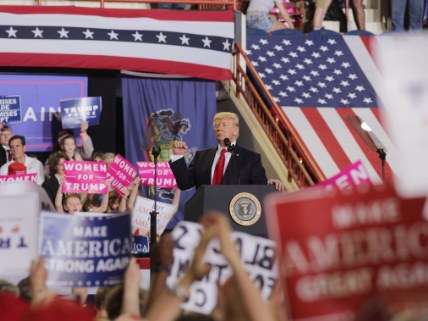No, Trump Won't Change the First Amendment, But It Matters That People Want To
Government censorship always wears the mask of 'public interest,' and this will be no different.

President Donald Trump's willingness to alter the terms of the First Amendment as part of his desire to censor critical press of him is firmly established: See his constant complaints of "fake news" (to be fair, his complaints are sometimes correct) and his desire to "open up libel laws." The president has no direct influence over the content of libel laws because they're state-level laws. There are many pivotal Supreme Court rulings on the relationship between libel laws and the First Amendment protections of free speech and a free press. Trump would have to rewrite the First Amendment in order to get what he wants.
Trump is not going to be altering the First Amendment. Let's just start with that. Even if he weren't an extremely divisive president, it would be quite the uphill battle. But it is worth taking note at how establishment officials looking to maintain influence within the Trump administration respond. It's worth separating out what is possible from what is likely.
The coverage of Sunday interview between ABC's Jonathan Karl and White House Chief of Staff Reince Priebus on This Week seems designed for the purpose of keeping this fight between Trump and the press on front burner, as if the president's absence from the White House Correspondents Dinner and counter-rally didn't already have that effect.
Priebus knows that Trump isn't changing anything about the First Amendment and that there will be no changes to libel laws in the near future. But he is not willing to say that. He can't. He won't. So during his Sunday interview with Karl he says "It's something we've looked at. How that gets executed or whether that goes anywhere is a different story."
We don't know what "looked at" means (perhaps a Google search of pages that explain state libel laws?), but some media analysts are concerned about the implications that this might actually happen. It probably won't, but the media benefits from playing up this conflict as much as Trump does.
Let's take a look at where that conversation shifted after talking about libel laws, because that's where I'd rather we were paying attention. Trump has also said he would like to criminalize flag-burning, which Priebus also vaguely defended in a similar fashion. There is a lot of popular support for laws against burning flags, though when truly pressed, a majority of Americans tend to come down against a constitutional amendment. The wording of the poll question matters.
Trump is not alone in his desire to change the First Amendment in ways that benefit his particular world view, and if nothing else, his efforts should be use as an object lesson. Priebus complains that the press has been irresponsible in its reporting. This is not a new complaint from government officials targeting the press. In the wake of the Edward Snowden revelations, the New York Times itself (a noted Trump target) hosted commentary by Michael Kinsley suggesting there needed to be some sort of oversight over what the press was allowed to publish.
Americans have a remarkable facility for looking for exceptions to the First Amendment and deciding that some controversial or unpleasant statements simply are not valid forms of speech. On the other side of the aisle, there's a concerted push to invalidate the Supreme Court's Citizens United decision by attempting to amend the Constitution to deprive corporations of legal personhood and of their right to free speech.
And we more prominently have the current push to insist that "hate speech" does not qualify as "free speech" and the belief by many poorly educated Americans (some of whom are actual politicians who should know better). These comments by Priebus should be reminders that if and when there are restrictions placed on the free speech of American citizens, it's the leaders of government who will be calling the shots. We have a president who is thin-skinned and self-interested. We also have any number of political operatives who are willing to play along with him in order to maintain power.
That is all to say, in the event the First Amendment does face the threat of actual new restrictions it will bear the stamp of "public interest." It will be a lie, but not as obvious a lie as what Trump is trying to sell. Guys like Priebus (on both sides of the aisle) will happily sell the Bill of Rights down the river if it will help facilitate the type of government control over society that they want. The Trump administration may deregulate businesses on the one hand, and that's great, but they really have no interest in making the government less powerful.
Back in December, Matt Welch provided a useful five-step process in countering Trump's bad ideas. It's definitely worth reading here.


Show Comments (84)